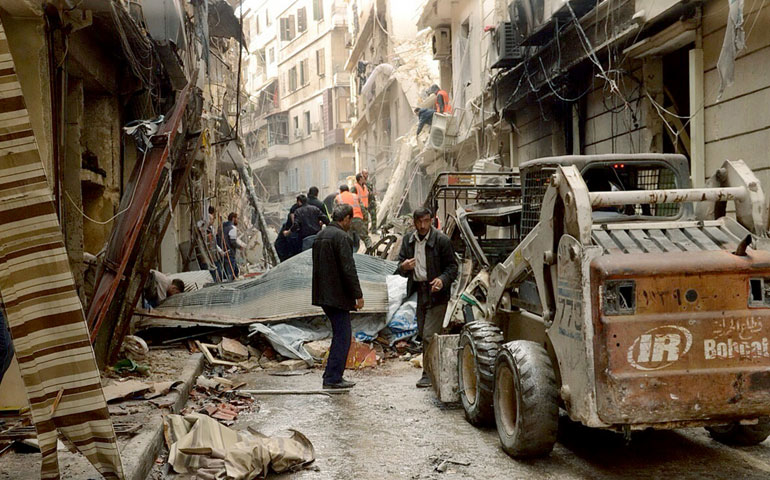
Syrian citizens clear streets in late April after shelling in Aleppo. (CNS/Reuters/Syrian Arab News Agency)
I'm back from Beirut, where I presented a workshop on resilience to the Blue Marists, a group of laywomen, laymen and brothers serving refugees in war-ravaged Aleppo, Syria. I've been following stories in the media about the suffering refugees are enduring on their dangerous journey to what they hope is a better future. Amazingly, I've seen little about caregivers who have remained in Syria to provide aid and comfort to those who are hungry, thirsty and urgently need medicine.
For them, remaining resilient takes enormous effort and great faith that must be focused if it is to remain and maybe flourish rather than burn out. When resiliency does deepen and grow, those who experience it realize that it is not the darkness that matters; it is how we stand in that darkness. Trauma from without and within need not be the last word, it may actually be the first word in a new sense of faith and life.
My goal with the Blue Marists was to work alongside them to uncover words of resilience that would help them put as much of their life and work into perspective so that their faith and actions would be as rich as possible, especially in the darkness that surrounded and sometimes overwhelmed them. The words we discovered were not only valuable to them in their situation; they are also words that can aid any of us during experiences of loss, betrayal, anxiety, stress and darkness. They are community, faithfulness, prayerfulness and humility.
Community represents a psychological and spiritual stalwart in times of challenge. It helps us to appreciate the Cameroonian saying, "If you wish to go fast, go alone. If you wish to go far, go together."
I asked the participants to consider this and be sensitive to four voices or friends in their own community:
- The prophet who asks us the question, "To whose voices are you listening to as you decided your path in life?";
- The cheerleader who offers us a sympathetic voice and helps us see the reflecting face of God's love;
- The harasser or teaser who helps us catch ourselves when, in an effort to take the care of others and our faith seriously, we inadvertently take a detour and take ourselves too seriously instead;
- The inspirational or spiritual friend who calls us to be all that we can be without embarrassing us that we are where we are at this point.
Faithfulness is also an essential word, especially when we are up against such great odds. When the caregivers were ready to scream in frustration and with a sense of failure, "I can't do it any longer — I must leave what I am doing," they also began to appreciate the need to recast one's perspective to recognize that success is not what really matters. It is faithfulness.
Prayerfulness is a third key aspect that surfaced. What is needed is a prayer life that is open to seeing God everywhere and finding meaning in new and deeper ways when life is traumatic and tough.
When a bus on a journey to Damascus is bombed, the initial natural reaction may well be "Where was God to allow this?" Yet, after a while, people of faith often share that after the explosion they came to believe "God was actually on the bus with me."
The final word is humility. Experiencing this virtue helps us to not be guilty of either the extreme of inordinate self-doubt on the one hand, or unwarranted self-confidence on the other. If we wish to be resilient we need to seek it, because when we take knowledge and add humility, we get wisdom, and when we take this wisdom and add it to compassion, we get love. And God is love, and this love is at the heart of caregiving and the heart of life.
The Blue Marists who work and live in Syria are surrounded in darkness, but a light within leads them to stay and help. Some will leave at some point because they must. However, whether they stay or go at any point, they have strengthened their faith because of what they have done and how they have learned to resiliently face the darkness.
They will also be remembered by the many they have served and they definitely will be remembered by me, who came to serve them and left inspired.
[Robert J. Wicks is the author of a number of books on resilience, including Riding the Dragon; Bounce: Living the Resilient Life; Spiritual Resilience; and a work of fiction on facing loss, Conversations with a Guardian Angel.]




